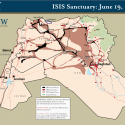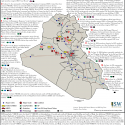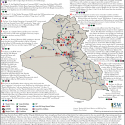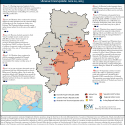Iraq Situation Report: June 20 - 22, 2015
Jun 22, 2015 - Sinan Adnan
The influence of Iranian-backed Iraqi Shi’a militias is extending beyond Iraq’s security sector and creating political friction.

The influence of Iranian-backed Iraqi Shi’a militias is extending beyond Iraq’s security sector and creating political friction.

ISIS or other anti-government armed groups such as the Ba’athist leaning JRTN may attempt to foment ethnic violence between Arabs and Kurds as well as sectarian violence between Sunni and Shi’a.

ISIS Sanctuary: June 19, 2015

The Iraqi Interior Ministry (MoI) reportedly directed Iraqi Air Force (IAF) airstrikes that killed 53 would-be “suicide bombers,” 23 north of Hit and 30 in Fallujah, the latter reportedly staging for Baghdad.

ISIS launched a VBIED wave of at least 13 VBIEDS on Saturday, June 13 north and south of Fallujah, near Haditha, and south of Baiji.
Recent attacks in Egypt on the one-year anniversary of the fall of Mosul indicate that ISIS’s affiliate in the Sinai may seek to target the Western military forces and the Egyptian state over the course of the next six weeks.

The Iraqi Security Forces (ISF) and the “Popular Mobilization” have strengthened their hold on Baiji district but clashes persist in the area amidst talk of upcoming operations against Baiji Refinery.

The purpose of this intelligence forecast is to outline ISW’s assessment of the courses of action available to Syrian actors and their principal benefactors over the next six months. ISW assesses that the dynamic stalemate that has defined the Syrian civil war since 2013 may be broken in this timeframe.

Russian-backed separatists maintained heightened offensive operations along the front line in the week following the June 3 assault on Ukrainian forces west of Donetsk. Attacks intensified near the H20 and T1303 highways which respectively link the separatist-held capitals of Donetsk and Luhansk to the major government-controlled cities of Mariupol and Sievierodonetsk.